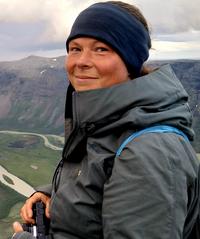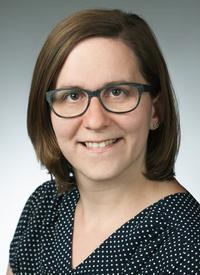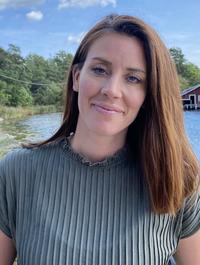They have studied Education for Sustainable Development
Meet Karin, Katharina, Jennifer and Sarah, four students who have finished their studies on the Master's Programme in Education for Sustainable Development. The programme is entirely web-based and explores how education can support critical inquiry and be a positive force for transformation and change for a more sustainable future.
Karin Kers
From: Sweden
Background: Upper Secondary School teacher in social sciences and history
Today: Have tried quite a few new things in her teaching in Upper Secondary school. In everything she teaches there’s a sustainability perspective and some tasks are completely connected to this.
Why did you want to study the Master's Programme in Education for Sustainable Development?
– To become better at teaching in relation to sustainability issues and to get this to permeate all my teaching. The education was beyond my expectations with more critical views.
Can you describe an ordinary day during your studies?
– Usually there was a lot of reading and completing tasks, sometimes combined with group discussions and sometimes working with classmates. Quite regularly I met other students digitally for “fika” (a digital cup of coffee). I spent about 40 h per week including some digital “fika” meetings for discussing tasks with fellow students. It is an advantage to be able to study when it suits you, enables combining it with work. Digital meetings somehow make up for the lack of social contact but not completely, which is the only disadvantage with the programme.

Jennifer Jakob
From: Austria
Background: Bachelor´s programme in teacher training in the subject area Protestant religion. Worked for many years as a religious education (RE)-teacher in compulsory schools. Have finished a master’s programme called Religion in Peace and Conflict at Uppsala University.
Today: Employed at the University College of Teacher Education Vienna/Krems (KPH Wien/Krems), coordinating the programme for the education of protestant RE teachers. Teach mainly RE didacts, but in spring 2022 she will give a course about ESD for pre-service primary school teachers. Currently also working on a doctoral thesis at the University of Vienna
Why did you study the Master's Programme in Education for Sustainable Development?
- I became curious about the programme because on one hand I did not know much about sustainability, sustainable development and never heard of ESD before. On the other hand, I wanted to study something that is not explicitly related to religion or RE but related to education. So, I thought the programme is something where I could learn a lot, especially about a lot of new and very important issues.
How well did the programme meet your expectations?
- It turned out that the programme became quite an important milestone in my life. I really learned a lot of interesting things, for example hard facts about sustainability, but also about how to integrate them into educational settings. I would say the programme exceeded my expectations because I became aware of the importance of sustainability and ESD and it became important to what I do today (I did not expect that to happen).
What has the education led to?
- The ESD programme led me to an interesting question that I turned into my PhD project. I am currently working on my doctoral thesis at the University of Vienna, where I’m investigating the relation between RE and ESD. I am not teaching RE anymore, but I am now teaching pre-service (RE)teachers. Thus, ESD became a main emphasis in my teaching and research.
Jennifer finished her studies on the programme in 2020.

Katharina Serrano
From: Poland, living in Vanatu
Background: Law degree from the University of Groningen (NL) and a LLM programme in European and International Law. Master's degree in International Commercial Law at the University of Leicester (UK) and a PhD programme of study at the University of Central Lancashire.
Today: Will soon return to academia in the South Pacific. Hope to implement new knowledge in Pacific legal studies as well as in governance and capacity development initiatives for climate change adaptation in the Pacific Island countries.
How did it work to study completely at a distance?
- The programme was rich in online materials, which made studying online rather easy. Most prescribed texts were available from the university library in e-copy and I believe throughout the whole course of study I bought only one book in hard copy. The programme's online platform was well-structured, with good instructions on the expected readings, topic descriptions and assessment items.
Of course, the biggest disadvantage of online studies is that one does not get to meet people in person and there is no opportunity to have a chat with the lecturers after a class. I thought that I would miss the "social component" that I was so used to in my previous face-to-face studies. However, I was surprised to see how active my fellow students and most lecturers were in the online forums! We had great discussions online, supported by video classes and interactive seminars during which students had the opportunity to ask questions and get feedback. And there was also a very active Facebook ESD group which allowed us to informally meet and greet online. Some of us ESD-ers are in touch until today via various social media and I really value that. In hindsight, this was a great experience for me and I would be happy to study online again as it gives me the most flexibility and allows for life to happen while studying.
What has the education led to?
- The ESD study gave me a whole new perspective on the areas I had studied thus far. It made me more critical about what I know and the programme enhanced my knowledge of sustainable development as well as new research methods and approaches to SD. It also gave me a deep understanding of the teaching and learning methodologies relevant to SD. Before embarking on the ESD programme, I was working in academia and international development for quite some time, but I felt that I wanted to bring about real transformational change towards more sustainable development. I wanted to create more impact in my daily work and design learning environments that are capable of transforming participants' value systems towards more sustainability. Building on my current understanding of learning theories and their practical application, I feel much better equipped to embed ESD in tertiary education as well as in capacity development on the ground.
Katharina finished her studies on the programme in 2021.
Sarah Åkerblom
From: Sweden
Background: A bachelor's degree in tourism studies from Linköping University and a vocational teacher ID from Stockholm University.
Today: Working with business and destination development
Can you describe an ordinary day during your studies? How much time did you spend studying and did you have much contact with your fellow students?
I would say I spent quite some time reading all the literature but it was mostly online or in pdf so I used an app that could read them out loud so I could do other stuff at the same time while still learning. Writing the assignments will always take time, at least for me. We had, or we still have, a Facebook group where we could ask each other questions, help each other out, complain or cheer. Other than that I only saw them online during seminars.
What has the education led to?
I am currently working with business and destination development for Valdemarsvik municipalty. I dont know if I would have got this job if I didn´t do this master's programme and I use the knowledge I gained during the programme every single day. I think I grew a couple of inches these last two years and I would recommend it for anyone that is interested.
Sarah finished her studies on the programme in 2021.

